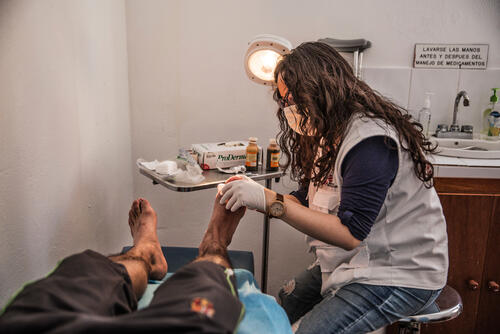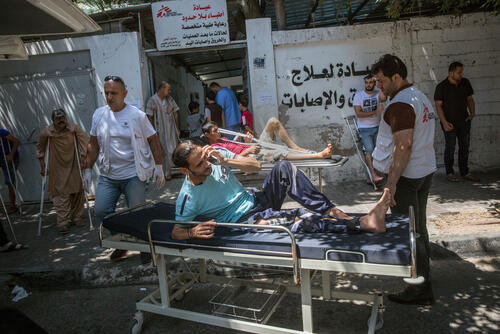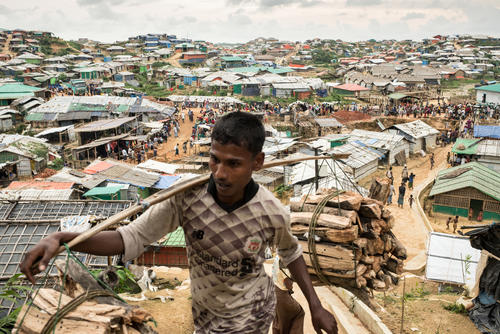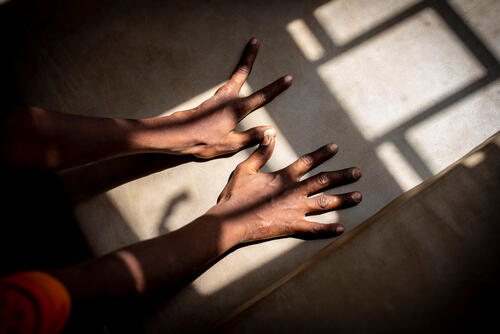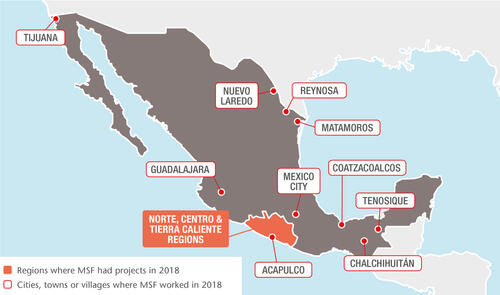
23,500
23,5
8,710
8,71
We have teams working on Mexico’s southern and northern borders, and at various key locations in between, offering medical, psychological and social support to migrants and refugees along the perilous migration route from Central America to the United States.
Our projects also assist vulnerable local communities and victims of violence, including sexual violence, in Guerrero state and in the border city of Reynosa.
The perilous journey north
Thousands of people from the Northern Triangle of Central America – El Salvador, Guatemala and Honduras – cross Mexico each year, the vast majority fleeing violence and poverty in their countries of origin.
Far from finding security and protection once in Mexico, people on the move face high levels of violence, including kidnappings, extortion, inhumane treatment, abuse, sexual assault and torture at the hands of criminal groups acting with total impunity, especially in cities on the borders.
The US government’s zero tolerance policies and restrictions on granting asylum, coupled with an increase in ‘security’ at the border, have only aggravated the crisis.
Although the migratory flows were similar to previous years, in 2018 our teams saw an increase in the number of women, children and families attempting a route traditionally undertaken mostly by men.
In Tenosique, known to be one of the main points of departure for journeys through Mexico, we provided medical, psychological and social assistance to increasing numbers of vulnerable migrants and refugees at Shelter 72.
We have a team offering similar services in La Casa del Migrante in Coatzacoalcos, Veracruz, where each day hundreds of people stop off before continuing north. Most of the health issues we treat are a result of people's arduous journeys, such as respiratory problems, skin infections, foot injuries and trauma from falls.
Many of them have also suffered some kind of physical or psychological violence, including sexual violence. In 2018, we installed an additional mobile clinic beside the railway tracks in Coatzacoalcos to cater for migrants waiting to board trains.
In Mexico City, we run a specialised therapeutic centre for migrants and asylum seekers who have been victims of extreme violence or cruel, inhumane or degrading treatment in their country of origin or on their journey. The centre offers patients a safe shelter while they receive medical and mental healthcare.
In 2018, we provided 52 patients with a combination of medical and psychiatric or psychological care, as well as accommodation, food and occupational therapy. In addition, we supplied referrals to other organisations for social assistance, legal advice and employment.
In February, we handed over to the local authorities the medical, psychological and social support activities we had been running in a migrant shelter in Guadalajara for the past year.
Tamaulipas borderlands
In Reynosa, a city that has been racked by violence for more than a decade, we continue to offer medical, psychological and social care to victims. We run a fixed clinic and send mobile teams to several parts of the city, including two migrant shelters.
In 2018, our teams also began assisting people recently deported from the United States in a reception centre on the border with Texas.
In September, an additional team consisting of a health promoter, a psychologist and a social worker started working at the reception centre for deported people and two migrant shelters in Matamoros, an industrial city on the border with the United States.
At the end of October, we started providing psychosocial support at La Casa Amar and La Casa Nazareth, two shelters for migrants and refugees in Nuevo Laredo, another of Mexico’s most dangerous cities. Medical care is also available at La Casa Nazareth.
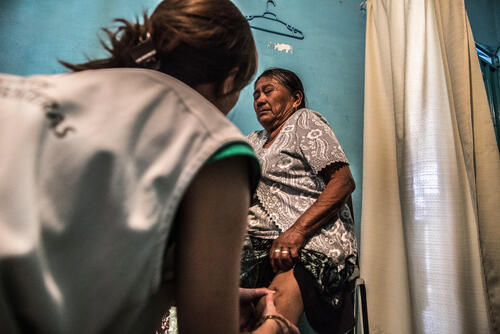
Guerrero state
We scaled up our activities in the Tierra Caliente, Norte and Centro regions of Guerrero, where violent turf wars between rival opium and marijuana producers affect entire communities, leaving them isolated and unable to access medical care.
In collaboration with the Ministry of Health, we run mobile clinics in 26 communities affected by the territorial conflict between criminal groups that produce poppies and marijuana.
Our teams offer medical, psychological and humanitarian assistance to victims of violence, as well as treatment for chronic diseases and sexual and reproductive healthcare.
We have also been providing mental health support and psychosocial care for victims of violence in Ciudad Renacimiento, Progreso, Zapata and Colonia Jardín, the most violent neighbourhoods of Acapulco, since 2016.
In December, we reduced our activities to focus on treating victims of sexual violence at Renacimiento hospital, in collaboration with the Ministry of Health. However, our team continues to monitor the health situation and is ready to respond to emergencies.
Emergency response
In January, a territorial conflict forced thousands of people from the communities of Chenalhó municipality, Chiapas, to flee to neighbouring Chalchihuitán. We sent a team of eight doctors and psychologists to provide medical care, individual and group mental health consultations and psychosocial support to about 1,000 people.
We also sent an emergency team to assist thousands of migrants and refugees stranded in the border city of Tijuana in December. As well as medical and psychological consultations, our teams carried out water and sanitation activities to improve hygiene conditions in the shelters.



